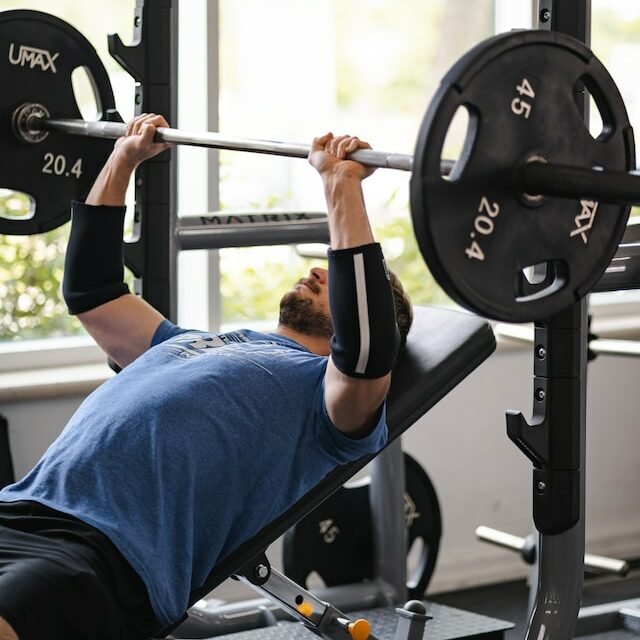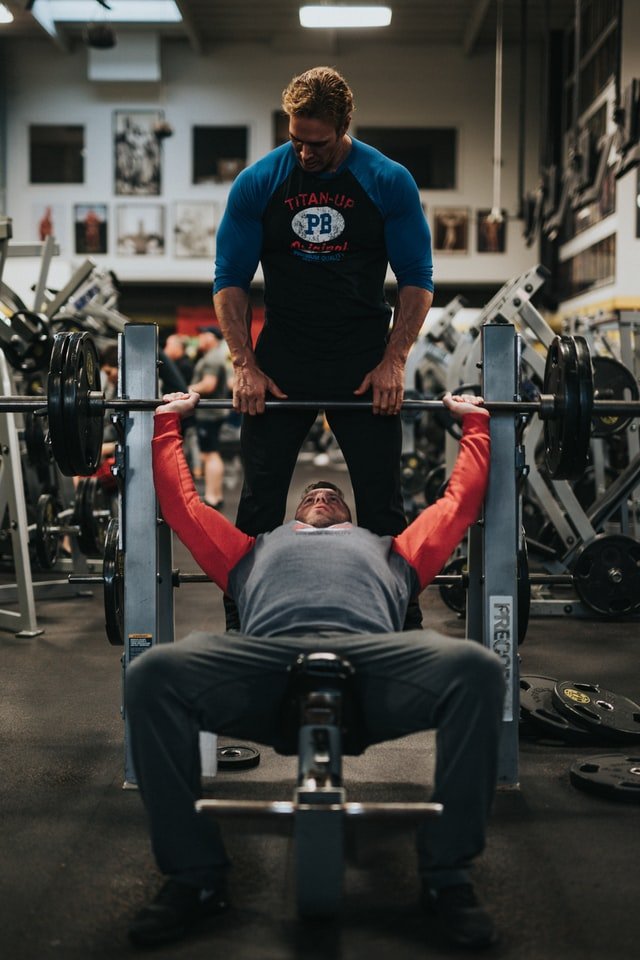Why Is My Bench Press So Inconsistent? Everything You Need To Know
Recently it may have come to light that your bench press isn’t where you want it to be.
You suddenly realise that sometimes you have one good session to maybe three bad ones and the weight you are lifting seems very inconsistent.
So, why is your bench press so inconsistent? Let’s find out.
Why is my bench press so inconsistent?
Your bench press may be inconsistent because of your technique, incorrect weightlifting form, or lack of strength in specific muscle groups. Not allowing your body to get enough rest and recovery, poor sleep and fatigue can contribute to inconsistency. Are you overtraining the exercise or overtraining in general? Maybe you have plateaued and you need to mix up the way you train. Set manageable goals and don’t let the thought of an inconsistent bench press play on your mind, don’t psyche yourself out of progression. What is the intensity of your training and at what time of day are you working out? Having a workout partner or spotter can help you gain some motivation and consistency in your routine. Improving your technique and form, as well as working on increasing your overall strength, can help to make your bench press more consistent.
Various factors can play a role in why you aren’t getting the kind of bench press gains you are aspiring to, let’s look at them and ways you can get back on track.
Poor technique
This comes up almost every time whenever people are having problems with any given exercise. If your technique is incorrect, you will never be able to properly target the muscles you are trying to work.
This in turn will lead to less-than-optimal gains and, in some cases, can also lead to injury.
Improving your technique should always be the first step when troubleshooting your bench press gains (or lack thereof).
Make sure you are doing the exercise correctly and can do a certain number of sets and reps with a weight you can control without blowing your form away with poor posture, just for the sake of lifting heavier than you realistically can.
Using the correct weight is also one of the most common reasons people have an inconsistent bench press.
If the weight is too light, you won’t be able to challenge your muscles enough to stimulate growth.
On the other hand, if the weight is too heavy, your form will start to deteriorate and you’ll be putting yourself at risk of injury.
Find a happy medium where you can maintain perfect form for the desired number of reps and focus on lifting that weight consistently.
Training too soon
If you aren’t allowing your body to fully recover after training and exercising too soon, whether it be on another body part or even the same (the chest), it’s going to ruin any potential gains you have made at the gym.
Your muscles need time to recover in order to grow.
If you are working out too soon, all you will be doing is breaking them down without giving them a chance to repair themselves and get stronger.
This will lead to an inconsistent bench press, as well as a general feeling of being run down all the time.
It’s important to allow for at least 48 hours of recovery time before working the same muscle group again.
If you find that you are still too sore to train after this time, take an extra day or two off.
It’s better to be safe than sorry.

Not enough rest
In order to see gains from your training, you need to be getting enough rest and sleep.
If you are constantly depriving your body of rest, it’s going to be difficult to make any progress.
Your muscles need time to recover and grow, and this process happens primarily when you are asleep.
So if you aren’t getting enough sleep, you can pretty much forget about seeing any real gains in the gym.
Aim for at least 8 hours of sleep per night, and if you can get more, even better.
You should also make sure you are taking a day or two off from the gym each week to allow your body to fully recover.
If you are training too often, you are just going to end up overtraining and will see a decrease in performance as a result.
Overtraining and training frequency
This ties into the same ballpark as not having enough rest and recovery.
If you are training too often and not allowing your body enough time to recover, you will eventually start to overtrain.
This is a common issue among people who are trying to make gains in the gym but aren’t seeing the results they want.
Overtraining can lead to a decrease in performance, as well as fatigue, aches and pains, and a general feeling of being run down.
If you think you might be overtraining, cut back on the frequency and intensity of your workouts and see if that makes a difference.
You might also want to consider taking a week or two off from training altogether to let your body fully recover.
Related: Why Is My Bench Press Not Improving? (All The Answers To Smash Through Plateau)
Fatigue
If you are constantly feeling tired, it’s going to be difficult to see any real gains in the gym.
Your body needs energy to lift weights and train properly, so if you are constantly feeling run down, it’s going to be difficult to make any progress.
Make sure you are getting enough sleep and eating a nutritious diet to ensure your body has the energy it needs to train properly.
You might also want to consider taking a pre-workout supplement to help you get through your workouts.
Just make sure you are not taking anything that contains caffeine if you are training later in the day, as it can make it difficult to sleep at night, which will then affect the gains you have made once again.
Injuries
If you’re coming off an injury, it’s important to take the necessary time to rest and recover before getting back into training.
If you try to train too soon, you risk re-injuring yourself, which will set you back even further.
Make sure you are fully healed before getting back into the gym, and ease yourself back into training gradually to avoid any further injuries.
The same applies if you have tweaked a muscle or ligament recently and you have “powered through” the pain.
It’s important to listen to your body and take the necessary time to recover before getting back into training, or you risk further injury.

Diet and hydration
What you eat and drink can have a big impact on your overall performance in the gym.
If you aren’t eating a nutritious diet, you are going to struggle to see any real gains.
Make sure you are getting enough protein to support muscle growth, and eat plenty of fruits and vegetables to ensure your body is getting the vitamins and minerals it needs.
You should also make sure you are staying hydrated, as water is essential for your body to function properly.
If you are constantly dehydrated, you are going to struggle to perform at your best in the gym.
Regular headaches, fatigue, and Feeling lightheadedness are all signs that you need to up your water intake.
Electrolytes are also important for hydration, so make sure you are getting enough of those through foods or supplements.
Aim to drink at least 2 litres of water per day, and more if you are training hard.
Stress
If you’re constantly stressed, it’s going to be difficult to see any real gains in the gym.
Your body needs to be in a relaxed state to train properly, so if you’re constantly stressed, it’s going to be difficult to get the most out of your workouts.
Make sure you are taking the time to relax and de-stress outside of the gym.
Yoga, meditation, and deep breathing are all great ways to help you relax and reduce stress.
You should also make sure you are getting enough sleep, as this is when your body recovers from the day and prepares for the next one.
If you’re constantly stressed, your body is going to be in a state of fight-or-flight, which will make it difficult to see any real gains in the gym.
Are you cutting?
If you are cutting, you need to make sure you are doing it correctly.
If you are cutting too many calories, you are going to struggle to see any real gains in the gym.
Make sure you are eating enough to support your training, and don’t be afraid to bulk up a bit if you need to.
It’s better to be a bit heavier and have more muscle than to be too light and not have enough muscle to show for it.
You should also make sure you are getting enough protein, as this is essential for muscle growth.
If you are cutting, make sure you are doing it correctly and not jeopardizing your gains in the gym.
Training intensity and volume
The intensity and volume of your training can also have an impact on your gains.
If you are constantly going all out in the gym, you are going to struggle to recover and grow.
You need to make sure you are giving your body enough time to recover between training sessions, and you shouldn’t be training too often.
Aim for 3-5 training sessions per week, and make sure you are giving your body enough time to recover in between.
You should also focus on quality over quantity.
It’s better to do a few sets of heavy lifting than it is to do a ton of sets with lighter weights.
Focus on quality over quantity, and make sure you are giving your body enough time to recover.
Change up training
If you have been doing the same training routine for a while, you may have reached a plateau.
Your body adapts to the stimulus it is given, so if you have been doing the same thing for a while, your body will have adapted and you won’t see any further gains.
To avoid this, you need to change up your training routine regularly.
This can mean anything from changing the exercises you do, to the sets and reps, to the amount of weight you are lifting.
Make sure you are constantly changing up your routine to avoid plateaus and to see continual gains.
Inconsistent bench presses can be caused by a number of different factors. Make sure you are aware of these factors and take steps to address them.
By doing so, you can ensure that your bench press becomes more consistent.
Having the right grip
Your grip width can have a big impact on your bench press.
If you have too narrow of a grip, you are going to struggle to recruit all of the muscles in your chest.
This can lead to an inconsistent bench press.
Instead, focus on using a grip that is about shoulder-width apart.
This will allow you to recruit all of the muscles in your chest and get a more consistent bench press.
Also, how you grip the bar can have an impact on your bench press.
If you grip the bar too tightly, you are going to tire out your muscles more quickly.
Instead, try to relax your grip and let the bar sit in your hand.
This will help you to save energy and maintain a consistent bench press.
Having the right grip width and grip can help to improve your bench press and make it more consistent.

Switch to dumbbells
If you have been using a barbell for your bench press, you may want to switch to dumbbells.
Dumbbells allow you to move each arm independently, which can help to correct any imbalances you may have.
This can lead to a more consistent bench press.
In addition, dumbbells allow you to get a greater range of motion.
This can help to target your muscles more effectively and lead to a more consistent bench press.
Consider switching to dumbbells if you want to improve your bench press and make it more consistent.
Muscle imbalances
If you have muscle imbalances, it can lead to an inconsistent bench press.
Muscle imbalances can be caused by a number of different factors, including incorrect technique, incorrect grip width, and incorrect weightlifting form.
To correct muscle imbalances, you need to focus on exercises that target the weaker muscle group.
For example, if your left side is weaker than your right, you need to focus on exercises that target the left side.
This could include doing single-arm dumbbell presses or unilateral exercises.
By targeting the weaker muscle group, you can correct the imbalance and improve your bench press.
What time of day are you training?
The time of day that you train can have an impact on your bench press.
If you train late at night, you may be more tired and your muscles may not be as fresh.
Instead, try to train earlier in the day when you are more rested.
This can help to improve your bench press and make it more consistent.
Being bogged down by the mental and physical demands of your daily routine can make it hard to change when you train.
Set sometime aside each day for your workout and make sure you are well-rested before you train.
I know some people can’t imagine training in the morning, just like some people can’t stand the thought of training after a hard day’s graft.
We all have different philosophies and training ideals, so do what works best for you.
Related: How Fast Should My Bench Press Be Increasing As A Beginner? All The Answers For Rapid Progress
Mobility and range of motion issues
If you have mobility or range of motion issues, it can lead to an inconsistent bench press.
To correct these issues, you need to focus on stretching and mobility exercises.
One of the best ways to improve your mobility and range of motion is to foam roll.
Foam rolling helps to release any tightness in your muscles and improve your range of motion.
In addition, stretching can help to improve your range of motion and reduce any tightness in your muscles.
Static stretches, dynamic stretches, and PNF stretches are all effective ways to improve your mobility and range of motion.
Try incorporating foam rolling and stretching into your routine to improve your bench press and make it more consistent.
Is it mental?
Are you mentally stopping yourself from being consistent with your bench press?
One of the biggest hurdles to overcome when trying to be consistent with your bench press is the mental aspect.
If you don’t believe in yourself, it will be very difficult to progress.
You need to have faith in your ability to bench press and believe that you can do it.
In addition, you need to be mentally tough and push through, especially when you are trying to lift what you consider to be a heavy weight.
You need to be mentally strong and have faith in your ability to bench press if you want to be consistent.
Inconsistent bench pressing can be frustrating, but it doesn’t have to be the end of the world.
Visualisation is a great way to overcome any mental hurdle.
Picturing yourself successfully bench pressing can help to increase your confidence and improve your performance.
Try to focus on the process and the journey, rather than the end goal.
Set small, achievable goals and reward yourself for reaching them.
By taking small steps, you can eventually reach your ultimate goal.

Set manageable goals
One of the reasons why your bench press may be inconsistent is because you are setting unrealistic goals.
If you are constantly trying to lift heavier weights and add more reps, you are setting yourself up for failure.
Instead of trying to do too much too soon, set small, manageable goals.
Focus on improving your technique and perfecting your form.
Once you have mastered the basic movement, you can start to add weight.
By taking small steps, you can eventually reach your goals and have a more consistent bench press.
If you are struggling to add weight to your bench press, you may want to focus on reps instead.
Instead of adding weight, focus on adding reps.
Doing more reps can help to build up your muscles and improve your strength.
Once you have built up your strength, you can then start to add weight.
By adding reps, you can improve your bench press quite a bit.
Working other muscles is key, not just chest
You might be having problems because you are not working other muscle groups.
The bench press is a compound exercise, which means it works multiple muscles at the same time.
In addition to your chest, the bench press also works your shoulders, triceps, and core.
If you want to have a strong bench press, you need to make sure you are working all of these muscle groups.
One of the best exercises you can do to improve your bench press is the overhead press.
The overhead press works your shoulders, triceps, and core.
In addition, it helps to improve your stability and balance.
The overhead press is a great exercise to add to your routine if you want to improve your bench press.
Working out alone? Get a spotter or partner
If you are working out alone, you may be having problems because you don’t have a spotter or partner.
A spotter or partner can help you to stay consistent with your bench press.
They can help you to stay motivated and push through when you are struggling. In addition, they can help you to stay safe when you are lifting heavy weights.
If you don’t have a spotter or partner, you may want to consider joining a gym if you can.
In addition, you will have access to all the equipment you need to have a successful workout.
Inconsistent bench pressing can be frustrating, but it doesn’t have to be the end of the world.
Final Thoughts…
There are many reasons why your bench press may be inconsistent.
It could be because of your technique, incorrect weightlifting form, or lack of strength in specific muscle groups.
Not allowing your body to get enough rest and recovery, poor sleep and fatigue can contribute to an inconsistent bench press.
You may be overtraining the exercise or in general. Maybe you have plateaued and you need to mix up the way you train. Set manageable goals and don’t let the thought of an inconsistent bench press play on your mind.
Don’t psyche yourself out of training. What is the intensity of your training and at what time of day are you training?
All of these factors can contribute to an inconsistent bench press.
If you are struggling with your bench press, don’t give up.
Keep working at it and you will eventually see the results you are looking for. Thanks for reading.
Have you noticed inconsistency with your bench press? If so, how did you stop the problem? Let me know in the comments below.
If you enjoy sport and use CBD to help with your recovery in between gruelling workouts, then you are in the right place. Here at Sport CBDs, we train hard and recover the best way possible…
We have regular workouts (check out the YouTube channel), CBD news and CBD products to help you gain that edge!
If you wanted to check out the reputable CBD we have on offer here at the site, then please head to the Sport CBDs Store (CLICK HERE). We also do fitness clothing and yoga accessories too.
Until next time, all the best…


